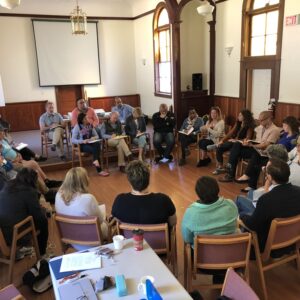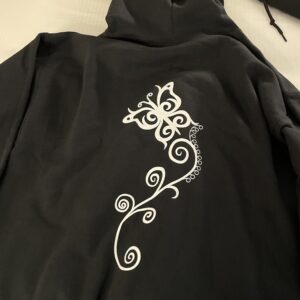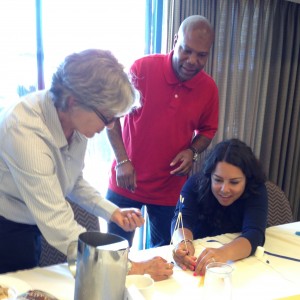Blog: The Wise Organization
Welcome to the Wise Organization Blog!

The Wise Organization: exploring how we transcend traditional bureaucratic forms to discover more authentic, networked, connected, responsive, emergent, fluid forms that can address the complex world and the revolutionary speed of learning and knowledge creation and use. Read More
A Little Essay on How Communities of Practice and Dense Networks can result in high quality learning and outcomes for ALL students: Collaborative Capacity and System Symmetry

Community of Practice members engage in a Consultancy about their district change work
What we need for systemic transformation is an emergent and qualitatively different learning and leadership experience of participants (teachers, students, community members, school leaders, district people) that results in emergent and qualitatively different practices and actions. Read More
Healing and Re-Humanizing Our Education System

Design by Peter McKay
How might we heal our way to a deeper kind of learning and definition of success for each and every student and adult in our educational system? Read More
Transforming Learning Is a Journey. Here Are Some Essential Lessons So We Can Treat It Like One!

Eight metaphors from a long and challenging hike through the Pyrenees offer essential lessons for transforming learning in schools and districts. Read More
Pt. 2: Emancipatory Organizational Design: An Alternative to School and District Bureaucracy

An emancipatory organizational design is a series of fractals (that is, symmetrical forms at all levels) of what we want to see in the learning environment.
Eight characteristics of an "emancipatory organizational design" for school districts can move our school systems to ones that create coherence, equity, and powerful learning for students and adults. Read More
Pt. 1: School and District Bureaucracy Has Failed Us All. What Are Some Alternatives?

Creating coherence, equity, and powerful learning in our existing school district bureaucracies and hierarchies is a challenge. But there is a way forward. Read More
But Why TeamWork?

You need wildly divergent thinking and experiences in order to converge on new ideas or new products. The paradox is, wildness and freedom in the content of your work require structure and deliberateness in the process of your work; otherwise, what you get is wildly dysfunctional or even dangerous, and often completely unproductive. So. To do out of the box thinking requires a box to contain that work. We create deliberately structured processes to free us to do unstructured thinking, and those structured processes are the stuff of effective teamwork. But that requires letting go of the notion that you can control any of this; you and your teammates can only guide and nurture these processes. Conditions can be developed. Knowledge, skills, and habits of mind can be cultivated and learned. The internet is full of resources for the processes and tools your team will need. The practice that it takes to make it all work together, you will have to do yourselves. Read More
Geology, Fear, and Organizational Change

Geology Reflected
Sometimes ideas from far sectors of my world converge in ways that send me spiraling (recursively? interpolatively? extrapolatively?) into some new inquiry that I could never have imagined before. That is what is exciting me and driving my thinking today, after reading an astounding piece by Richard Elmore about school improvement, hearing about the effects of fear on some significant changes in the life circumstances of my yoga teacher, and reflecting on an increase in my understanding about somatic responses to trauma that I’ve been offered by a colleague of mine with considerable expertise in that area (that last combined with my experiences with a brilliant somatic therapist who helped me address some of my own generational trauma). I am deeply grateful for these disparate sources of wisdom in my life, and then to see that in some mysterious ways they are weaving together a new understanding about my work just exponentially enlarges that gratitude. Read More
Working on a Conceptual Framework for a Study of Communities of Practice in Educational Settings – What do you think?

Initial Graphic Thinking About a Conceptual Framework for a Study of Community of Practice Development in Educational Organizations
CoP’s develop organically, originating out of a concern or issue or passion or sense of purpose that a growing group of people come to realize that they share, and an emergent set of skills and knowledge related to those that the group also shares. In the literature, these are referred to as Domain, Community, and Practice (Wenger, cite); we will use those three concepts as “orienting theory” as we study several emerging communities. Read More
“Yielding at every moment to the perfect freedom of single necessity”

I want to suggest a new ritual activity. Not making myths of heroic and superhuman effort. Not myths of heroic leaders who single-handedly swoop in on a white horse to save the damsel in distress or solve the problem, then ride off into the sunset. It's not even about solving problems or fixing things. I want to suggest a ritual activity of embedding ourselves in a matrix of relationships, a social ecosystem, fully engaged and totally surrendered, squared to what is, where we see our work life not as a problem to be solved, but as a gift to be explored... Read More
Communities of Practice: An organic approach to organizational transformation?

In a recent article, Jal Mehta from the Harvard Graduate School of Education brilliantly explores the history of our current education system and explains why it is not structured for success. Mehta calls for restructuring education to "function more like a profession and less like a bureaucracy." The problems he describes, and the solutions he proposes, could all be addressed through the development of what Etienne Wenger calls "communities of practice..." Read More
Big [on] Data? What’s your Question?

So, I ask, are you a fan of big data? If so, what is your question? Taking into consideration what I say in this blog, you may find yourself using less data, but getting more out of it. That would be both healthier and more sustainable. Read More
Participation

People misunderstand participation. We hide from it in bad organizational metaphors. We use bad organizational structures to avoid it. We separate people into experts and doers. But true participation is at the heart of powerful organizations. It turns out that we will gain more and better ideas through gathering the varied experiences and perspectives of as many people as we can and creating a space for their interactions that is a little wild and wooly, but also respectful. Beyond "buy-in" and "ownership," beyond "top-down" and "bottom-up," even beyond "authorship," true participation implies a distributed yet collective sense of agency. That agency can be powerful, efficient, effective, and even transformational. Read More
Strategic Planning in a time of recession

Using Technology
An economic recession is not the time to shrink back in fear and hesitate to act, nor is it the time to act reactively, spasmodically, thrusting out into the markets with every new idea that it seems might produce income, nor is it the time just to continue to do what we’ve always done only harder with fewer resources. Read More
Characteristics of the Wise Organization

Some thoughts about what makes an organization wise, including ideas about Values, Systems understanding, Networking, Community, Knowledge creation, and Infrastructure. Read More
The Strange Attractor

The "Three Winged Bird" image represent three aspects, or "attractors" for conversation and work in healthy organizations: Values, Community, and Accomplishment. Read More
